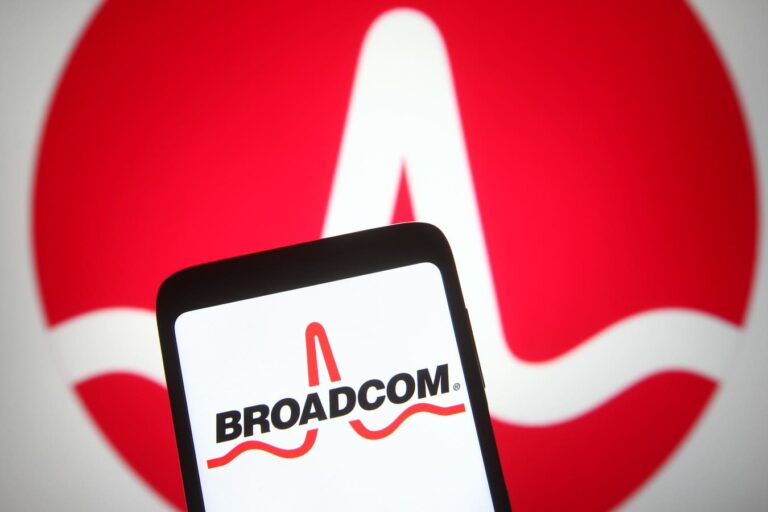shares of broadcom (AVGO) has fallen 12% since the company reported strong fiscal Q1 (January) results earlier this month and boosted its FY24 (October) AI revenue outlook.
Broadcom’s AI business has been growing rapidly, but investors were disappointed that the company did not raise its fiscal 2024 total revenue guidance from its previous estimate of $50 billion. In the fiscal year, infrastructure software revenue is still expected to account for 40% of total revenue.
Broadcom stock, which has recently been trading around $1,235, is up 10.6% since the beginning of the year, but is down 14% from its all-time high of $1,438.17 on March 4.
Broadcom’s total revenue in the first quarter increased 34% to $11.96 billion, beating consensus estimates of $11.72 billion, driven by a $2.1 billion revenue contribution from the recently completed acquisition of VMware. ). Total revenue excluding VMware rose 11%. Free cash flow was $4.7 billion and margin was 39%. Earnings per share were $10.99, 70 cents above consensus.
Semiconductor Solutions revenue for the quarter was $7.4 billion (62% of total revenue) and Infrastructure Software revenue was $4.6 billion (38% of total revenue).
In the semiconductor space, AI revenue quadrupled year over year to $2.3 billion (31% of total semiconductor revenue), more than enough to offset the current cyclical downturn in the enterprise and communications sectors.
Network revenue rose 46% to $3.3 billion (representing 45% of semiconductor revenue), accelerating from 23% growth in the October quarter. The division’s strong performance is primarily driven by strong demand for Broadcom’s custom AI accelerators at two hyperscaler customers, think Meta and Alphabet’s Google.
Broadcom is also seeing impressive expansion beyond AI accelerators. The company’s next-generation Tomahawk 5 800G switches, Thor 2 Ethernet NICs, DSPs, and optical components are experiencing healthy demand from hyperscaler customers and large enterprises deploying AI data centers.
Given the continued strength of AI demand, Broadcom now expects networking revenue to increase 35% in fiscal 2024, higher than its previous forecast calling for 30% growth.
AI revenue is expected to account for 35% of total semiconductor revenue in FY2024, compared to the previous outlook of 25%. This will bring AI revenue to over $10 billion, with AI accelerators accounting for 70% of this total. Switches and routers are expected to account for more than half of the remaining 30%.
For its VMware division, Broadcom expects sequential double-digit revenue growth in the remaining quarters of fiscal 2024. The goal is to take customers who are already running compute workloads using vSphere virtualization tools and upgrade them to VMware Cloud Foundation, a complete virtualization software stack that integrates compute, storage, and networking. Continue to upsell to VMware customers, with a focus on and modernize customer data centers.
Following the first-quarter report, Baird raised Broadcom’s price target to $1,500 from $1,265, noting the strength of its AI business more than offsets incremental weakness in the company’s broadband and storage divisions. Did. Citi raised its target from $1,100 to $1,560 as it sees continued upside from AI and expects synergies from the VMware acquisition. BofA touted its robust AI pipeline and raised its target from $1,500 to $1,680.
Broadcom last week expanded its portfolio of optical interconnect solutions for AI and machine learning applications. The company’s optical technology enables high-speed interconnection of front-end and back-end networks for large-scale generative AI computing clusters.
Broadcom released a 200 Gbps per lane electroabsorption modulated laser (EML) and demonstrated a 200 Gbps per lane vertical cavity surface emitting laser (VCSEL) to pair with next-generation GPUs. EML and VCSEL technologies play a key role in enabling high-speed interconnection of AI and machine learning systems. As enterprises continue to demand large-scale AI clusters, cutting-edge optical interconnects are becoming increasingly important.
Broadcom also began deliveries of Bailly, the industry’s first 51.2 Tbps concurrent packaged optical Ethernet switch. The product integrates eight silicon photonics-based His 6.4 Tbps optical engines and Broadcom’s StrataXGS Tomahawk 5 switch chips. Bailly enables optical interconnects to operate with 70% lower power consumption and is 8x more silicon area efficient compared to pluggable transceiver solutions.
On Wednesday, March 20th, Broadcom will host an investor meeting, “Broadcom Enabling AI in Infrastructure.” Charlie Kawas, president of the company’s Semiconductor Solutions Group, will lead a discussion about Broadcom’s merchant silicon portfolio.
follow me twitter. check out my website.


